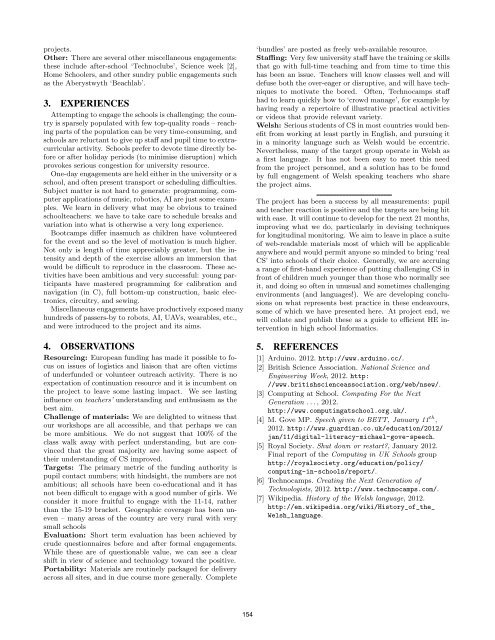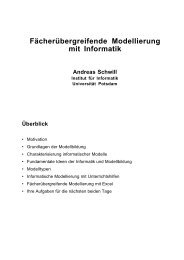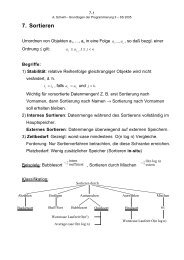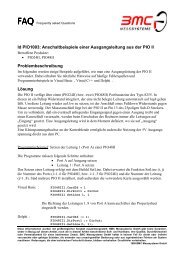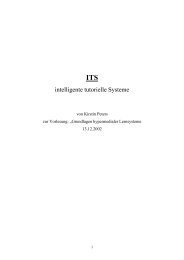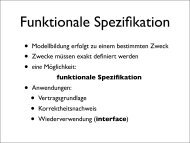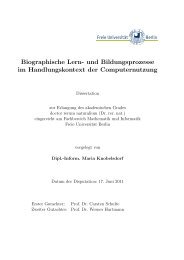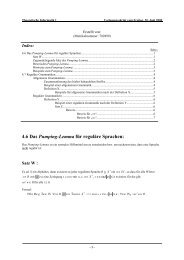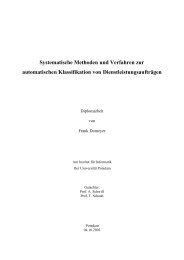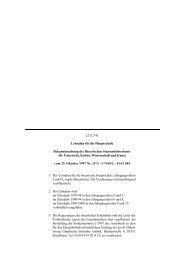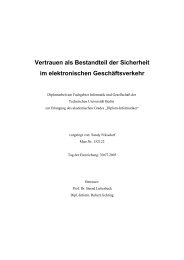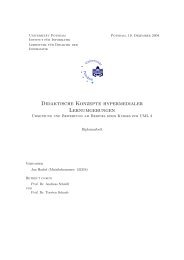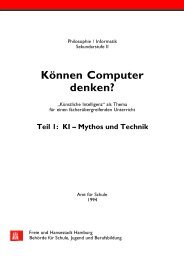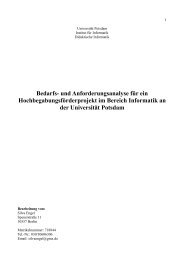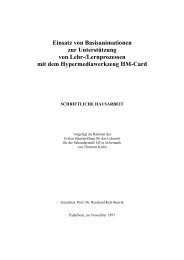Maria Knobelsdorf, University of Dortmund, Germany - Didaktik der ...
Maria Knobelsdorf, University of Dortmund, Germany - Didaktik der ...
Maria Knobelsdorf, University of Dortmund, Germany - Didaktik der ...
Create successful ePaper yourself
Turn your PDF publications into a flip-book with our unique Google optimized e-Paper software.
projects.<br />
Other: There are several other miscellaneous engagements:<br />
these include after-school ‘Technoclubs’, Science week [2],<br />
Home Schoolers, and other sundry public engagements such<br />
as the Aberystwyth ‘Beachlab’.<br />
3. EXPERIENCES<br />
Attempting to engage the schools is challenging; the country<br />
is sparsely populated with few top-quality roads – reaching<br />
parts <strong>of</strong> the population can be very time-consuming, and<br />
schools are reluctant to give up staff and pupil time to extracurricular<br />
activity. Schools prefer to devote time directly before<br />
or after holiday periods (to minimise disruption) which<br />
provokes serious congestion for university resource.<br />
One-day engagements are held either in the university or a<br />
school, and <strong>of</strong>ten present transport or scheduling difficulties.<br />
Subject matter is not hard to generate: programming, computer<br />
applications <strong>of</strong> music, robotics, AI are just some examples.<br />
We learn in delivery what may be obvious to trained<br />
schoolteachers: we have to take care to schedule breaks and<br />
variation into what is otherwise a very long experience.<br />
Bootcamps differ inasmuch as children have volunteered<br />
for the event and so the level <strong>of</strong> motivation is much higher.<br />
Not only is length <strong>of</strong> time appreciably greater, but the intensity<br />
and depth <strong>of</strong> the exercise allows an immersion that<br />
would be difficult to reproduce in the classroom. These activities<br />
have been ambitious and very successful: young participants<br />
have mastered programming for calibration and<br />
navigation (in C), full bottom-up construction, basic electronics,<br />
circuitry, and sewing.<br />
Miscellaneous engagements have productively exposed many<br />
hundreds <strong>of</strong> passers-by to robots, AI, UAVs, wearables, etc.,<br />
and were introduced to the project and its aims.<br />
4. OBSERVATIONS<br />
Resourcing: European funding has made it possible to focus<br />
on issues <strong>of</strong> logistics and liaison that are <strong>of</strong>ten victims<br />
<strong>of</strong> un<strong>der</strong>funded or volunteer outreach activity. There is no<br />
expectation <strong>of</strong> continuation resource and it is incumbent on<br />
the project to leave some lasting impact. We see lasting<br />
influence on teachers’ un<strong>der</strong>standing and enthusiasm as the<br />
best aim.<br />
Challenge <strong>of</strong> materials: We are delighted to witness that<br />
our workshops are all accessible, and that perhaps we can<br />
be more ambitious. We do not suggest that 100% <strong>of</strong> the<br />
class walk away with perfect un<strong>der</strong>standing, but are convinced<br />
that the great majority are having some aspect <strong>of</strong><br />
their un<strong>der</strong>standing <strong>of</strong> CS improved.<br />
Targets: The primary metric <strong>of</strong> the funding authority is<br />
pupil contact numbers; with hindsight, the numbers are not<br />
ambitious; all schools have been co-educational and it has<br />
not been difficult to engage with a good number <strong>of</strong> girls. We<br />
consi<strong>der</strong> it more fruitful to engage with the 11-14, rather<br />
than the 15-19 bracket. Geographic coverage has been uneven<br />
– many areas <strong>of</strong> the country are very rural with very<br />
small schools<br />
Evaluation: Short term evaluation has been achieved by<br />
crude questionnaires before and after formal engagements.<br />
While these are <strong>of</strong> questionable value, we can see a clear<br />
shift in view <strong>of</strong> science and technology toward the positive.<br />
Portability: Materials are routinely packaged for delivery<br />
across all sites, and in due course more generally. Complete<br />
154<br />
‘bundles’ are posted as freely web-available resource.<br />
Staffing: Very few university staff have the training or skills<br />
that go with full-time teaching and from time to time this<br />
has been an issue. Teachers will know classes well and will<br />
defuse both the over-eager or disruptive, and will have techniques<br />
to motivate the bored. Often, Technocamps staff<br />
had to learn quickly how to ‘crowd manage’, for example by<br />
having ready a repertoire <strong>of</strong> illustrative practical activities<br />
or videos that provide relevant variety.<br />
Welsh: Serious students <strong>of</strong> CS in most countries would benefit<br />
from working at least partly in English, and pursuing it<br />
in a minority language such as Welsh would be eccentric.<br />
Nevertheless, many <strong>of</strong> the target group operate in Welsh as<br />
a first language. It has not been easy to meet this need<br />
from the project personnel, and a solution has to be found<br />
by full engagement <strong>of</strong> Welsh speaking teachers who share<br />
the project aims.<br />
The project has been a success by all measurements: pupil<br />
and teacher reaction is positive and the targets are being hit<br />
with ease. It will continue to develop for the next 21 months,<br />
improving what we do, particularly in devising techniques<br />
for longitudinal monitoring. We aim to leave in place a suite<br />
<strong>of</strong> web-readable materials most <strong>of</strong> which will be applicable<br />
anywhere and would permit anyone so minded to bring ‘real<br />
CS’ into schools <strong>of</strong> their choice. Generally, we are accruing<br />
a range <strong>of</strong> first-hand experience <strong>of</strong> putting challenging CS in<br />
front <strong>of</strong> children much younger than those who normally see<br />
it, and doing so <strong>of</strong>ten in unusual and sometimes challenging<br />
environments (and languages!). We are developing conclusions<br />
on what represents best practice in these endeavours,<br />
some <strong>of</strong> which we have presented here. At project end, we<br />
will collate and publish these as a guide to efficient HE intervention<br />
in high school Informatics.<br />
5. REFERENCES<br />
[1] Arduino. 2012. http://www.arduino.cc/.<br />
[2] British Science Association. National Science and<br />
Engineering Week, 2012. http:<br />
//www.britishscienceassociation.org/web/nsew/.<br />
[3] Computing at School. Computing For the Next<br />
Generation . . . , 2012.<br />
http://www.computingatschool.org.uk/.<br />
[4] M. Gove MP. Speech given to BETT, January 11 th ,<br />
2012. http://www.guardian.co.uk/education/2012/<br />
jan/11/digital-literacy-michael-gove-speech.<br />
[5] Royal Society. Shut down or restart?, January 2012.<br />
Final report <strong>of</strong> the Computing in UK Schools group<br />
http://royalsociety.org/education/policy/<br />
computing-in-schools/report/.<br />
[6] Technocamps. Creating the Next Generation <strong>of</strong><br />
Technologists, 2012. http://www.technocamps.com/.<br />
[7] Wikipedia. History <strong>of</strong> the Welsh language, 2012.<br />
http://en.wikipedia.org/wiki/History_<strong>of</strong>_the_<br />
Welsh_language.


